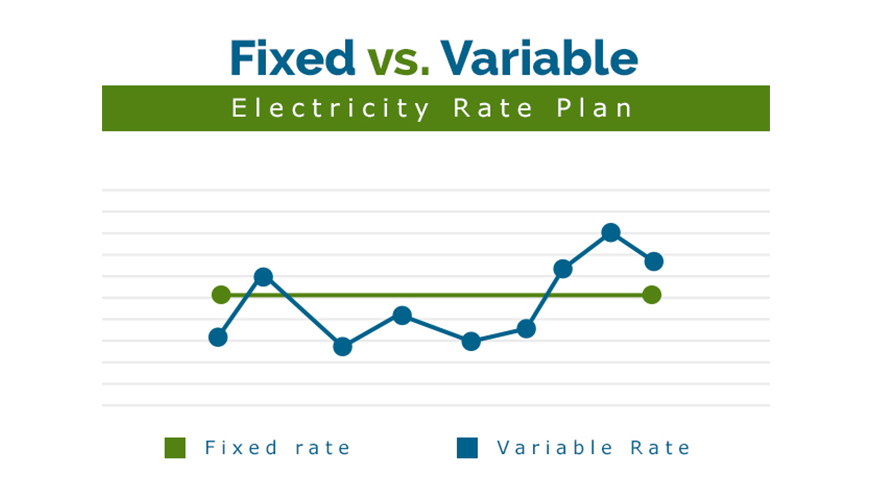When choosing energy from a supplier, you’ll often be faced with two options: fixed rate plans or variable rate plans. No matter what you choose, you’ll be taking a gamble at which type of plan is best suited to your own needs and lifestyle. For this decision (like most other decisions), knowledge is power. The more you know about the benefits and drawbacks of each plan, the better off you’ll be when it comes to savings, convenience, and overall satisfaction with your electricity supplier.
Fixed Rate
With a fixed rate plan, customers sign a contract with their suppliers to ensure that their energy price will stay the same for a certain period of time (it could range from several months to a couple years). Even when market prices change, you’re guaranteed to pay the same amount per kilowatt hour for the duration of the contract.
(Keep in mind that your electric bill will still fluctuate depending on the amount of energy you use. The fixed price is per kilowatt hour, not for the entire month.)
Pros:
In a market where electricity prices are rising, a fixed rate plan will save you the most money. Even if electricity prices go up, you’ll be able to keep paying the lower price on your contract until it expires.
One of the biggest benefits of fixed rate plans is that they provide consistency and reliability. You’ll never be surprised by a sudden upswing in energy prices. This can be especially useful for those who want to avoid risk when it comes to their finances.
Customers with a fixed rate will also have an easier time budgeting. As long as you keep track of your electricity usage, it’s easy to estimate what your electric bill will be each month and plan accordingly.
Cons:
If market prices fall during the time of your contract, you’ll get stuck paying a higher price until your contract ends.
Since your electricity supplier typically buys the electricity to match your contract at the time that you sign up, fixed rate plans generally have early termination fees. This prevents customers from backing out if they see the plan isn’t working in their favor price-wise. If you want to end the contract early, you will usually have to pay for it.
Variable Rate
Market prices for electricity are constantly changing; on the wholesale level, they can change every hour. This means that what you pay (per kilowatt hour) for electricity one month could be significantly higher or lower than what you paid another month. Factors that influence the price of electricity include temperature, weather conditions, and supply and demand. On a variable rate plan, your energy costs will fluctuate with the market.
Pros:
In an energy market where prices are falling, choosing a variable rate plan may end up saving you the most money. You’ll be able to take advantage of declining prices rather than being stuck in a higher-priced contract.
Variable rate plans work best for active customers who keep up with the energy market and are always on the lookout for the best price. With variable rate plans, there are often no cancellation fees. This means you have the freedom to switch providers and start a new plan whenever you find a better deal or whenever you think that market conditions will make it worth your while.
In addition, if you move frequently (or are planning to move in the near future), you might not want to lock yourself into a long-term contract that requires you to stay in a certain service zone. Variable rate plans give you the freedom to change plans and locations relatively easily.
Cons:
If market prices are rising, you’ll end up paying more than if you were on a fixed plan because those higher prices will be passed on to you each month.
Variable plans also may not be the best choice for someone with low risk tolerance. If a spike in energy costs one month could do real damage to your finances, you should opt for a more predictable plan.
In the end, the prices for both of these electricity plans usually even out. Your choice will often result in short-term rather than long-term savings. What’s really at stake in this decision, though, is having a payment plan that most suits your financial needs. When choosing a fixed rate over a variable rate, you’re trading flexibility and freedom for reliability and minimized risk. By considering this decision alongside your financial situation, your future plans, and your budgeting requirements, you’ll be able to choose a plan that best meets your household’s needs.


